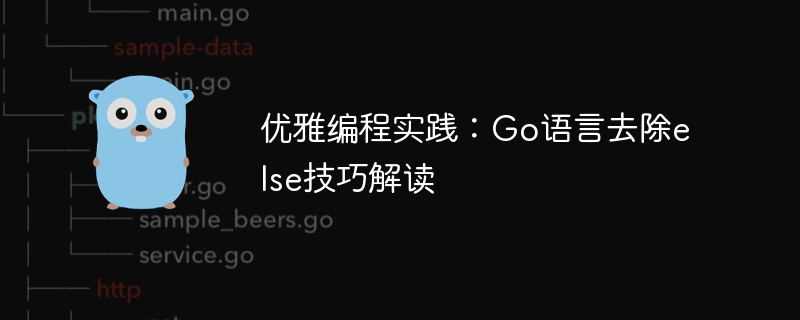

Elegant Programming Practice: Interpretation of Else Removal Skills in Go Language
In software development, writing elegant code is one of the goals pursued by every programmer. In programming practice, sometimes we find some techniques that can help us simplify the code logic and make the code more concise and readable. This article will introduce a technique commonly used in Go language: removing else.
In programming, the if-else structure is a common conditional control statement. But in actual coding, we often encounter situations where the else branch in the if-else statement is just to return a value or perform a simple operation. At this time, using the if-else structure seems a bit redundant. Directly converting if-else into a separate if statement can make the code more concise and clear.
Below we use a specific sample code to show how to simplify the code logic by removing else. Suppose we have a function that determines whether a number is negative and returns the corresponding string.
package main
import (
"fmt"
)
func checkNegative(num int) string {
if num < 0 {
return "负数"
}
return "非负数"
}
func main() {
num1 := -1
num2 := 1
fmt.Printf("%d 是%s
", num1, checkNegative(num1))
fmt.Printf("%d 是%s
", num2, checkNegative(num2))
}In the above code example, we defined a function checkNegative that receives an integer parameter num. If num is less than 0, Then return "negative number", otherwise return "non-negative number". In the main function, we call the checkNegative function on -1 and 1 respectively, and print the output results. Running the code, we can get the following output:
-1 是负数 1 是非负数
In the above example code, we use the if-else structure to determine whether a number is negative. But actually, we can make the code more concise by canceling else. The modified code is as follows:
package main
import (
"fmt"
)
func checkNegative(num int) string {
if num < 0 {
return "负数"
}
return "非" + "负数" // 使用字符串拼接避免else
}
func main() {
num1 := -1
num2 := 1
fmt.Printf("%d 是%s
", num1, checkNegative(num1))
fmt.Printf("%d 是%s
", num2, checkNegative(num2))
}By removing else, we can make the code more concise and readable. In actual coding, when encountering a branch with only a single operation, you may wish to consider using this technique to simplify the code. Of course, for complex logic, you still need to choose to use the if-else structure according to the actual situation. Elegant programming is a process of continuous exploration. I hope this article will be helpful to everyone in removing else in Go language.
I hope that through the above interpretation, readers can better understand the technique of removing else in the Go language and use it flexibly in actual development. I hope the code you write will be more elegant and concise!
The above is the detailed content of Elegant programming practice: interpretation of else removal techniques in Go language. For more information, please follow other related articles on the PHP Chinese website!
 Usage of Type keyword in Go
Usage of Type keyword in Go
 How to implement linked list in go
How to implement linked list in go
 What are the Go language programming software?
What are the Go language programming software?
 How to learn go language from 0 basics
How to learn go language from 0 basics
 What are the methods to implement operator overloading in Go language?
What are the methods to implement operator overloading in Go language?
 What are the operators in Go language?
What are the operators in Go language?
 Xiaomi computer data recovery method
Xiaomi computer data recovery method
 How to save programs written in pycharm
How to save programs written in pycharm




